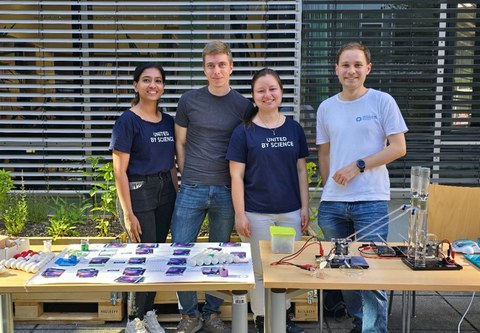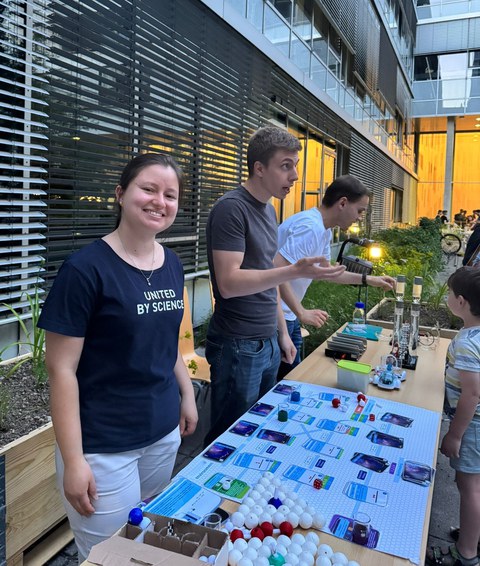Jun 26, 2025
Cluster G at the "Dresden Science Night"

The Cluster G stand (from left to right: SHK Megha Koottungal and doctoral students Stefan Röher, Lairana Lima Duarte and Jannik Amon)
On the evening of June 21, the Dresden Science Night once again showed that research unites and inspires - whether young or old. Under the motto "The night that makes you smarter", interested visitors were often able to gain an insight into current research in a playful and interactive way, including at TU Dresden.
As in previous years, Cluster G of the Boysen-TU Dresden-Research Training Group was also represented with its own stand with its doctoral students Lairana Lima Duarte (Project G1), Stefan Röher (Project G2) and Jannik Amon (Project G3) as well as student assistant Megha Koottungal. With exciting games and experiments, they once again introduced the numerous visitors to the basics of hydrogen technology and, in particular, catalysis research.
The first illustrative material was a model experiment in which electricity is generated using a small solar module. This is used in a PEM electrolysis cell by splitting water to produce green hydrogen and oxygen. The hydrogen and oxygen temporarily stored in glass flasks then react to form water again in a PEM fuel cell when the gas tap is opened, whereby the electricity generated in the process can be visualized by a consumer.

The doctoral students in full swing (from left to right: Lairana Lima Duarte, Stefan Röher and Jannik Amon).
The specially developed board game "Journey of an Oxygen" gave visitors a deeper insight into the cluster's specific research. The game takes up different ways of catalysis with different catalysts for oxygen reduction in the fuel cell. It playfully demonstrates the opportunities and complications that different catalyst materials bring with them and how complex a seemingly simple process such as oxygen reduction can be from a chemical point of view. The knowledge transfer with the help of the model experiment and the board game was also the occasion for many interesting conversations and discussions about the opportunities and risks of the energy transition and the possible role of hydrogen and the hydrogen economy in this transformation process.
Cluster G would like to thank all visitors for the stimulating exchange and the Faculty of Chemistry and Food Chemistry for the opportunity to participate in the Dresden Science Night!
